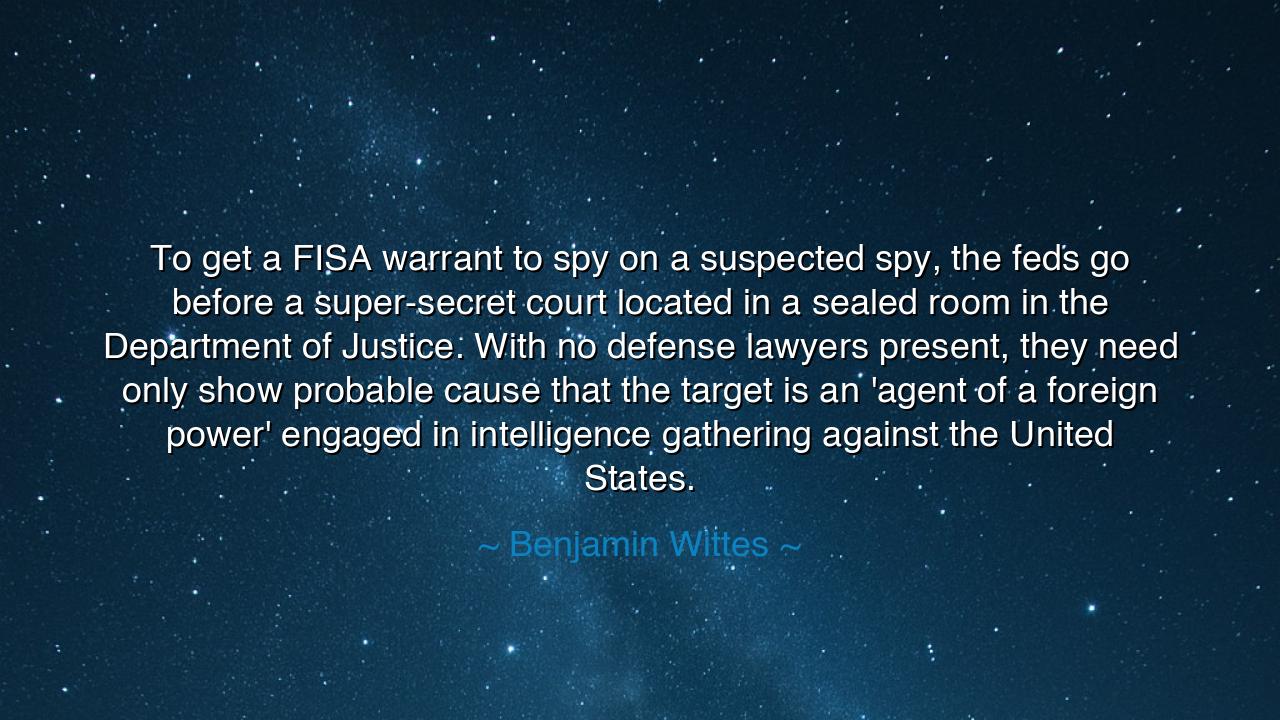
To get a FISA warrant to spy on a suspected spy, the feds go
To get a FISA warrant to spy on a suspected spy, the feds go before a super-secret court located in a sealed room in the Department of Justice. With no defense lawyers present, they need only show probable cause that the target is an 'agent of a foreign power' engaged in intelligence gathering against the United States.






In the shadowed realm where power and secrecy intertwine, the scholar and journalist Benjamin Wittes revealed a truth both profound and unsettling: “To get a FISA warrant to spy on a suspected spy, the feds go before a super-secret court located in a sealed room in the Department of Justice. With no defense lawyers present, they need only show probable cause that the target is an ‘agent of a foreign power’ engaged in intelligence gathering against the United States.” In these words lies the tension between security and freedom, between the guardians of the state and the liberties of its people. It is a quote that opens the veil on one of modern governance’s deepest paradoxes: that to protect democracy, the state must sometimes act in the dark.
The origin of Wittes’s reflection lies in his work as a chronicler of law, intelligence, and the delicate balance of justice in the age of surveillance. He speaks of the FISA Court — the Foreign Intelligence Surveillance Court — born out of the ashes of scandal and mistrust in the 1970s, when secret operations of the U.S. government had gone too far. Created to ensure oversight over the surveillance of potential threats, the FISA Court became a quiet sentinel, hidden deep within the walls of the Department of Justice, where its judges deliberate in silence. It is a court without public hearings, without juries, without defense attorneys — a court of one side only, where the government speaks, and the accused remains unheard, often unaware.
Herein lies the dual nature of intelligence — for it is both shield and sword. The secrecy that protects the nation from its enemies can, if left unchecked, become a veil over its own conscience. Like the priests of Delphi who spoke for the gods behind a curtain of incense, the agents of modern power speak in rooms without windows, carrying the burden of unseen truth. Wittes’s words are not a condemnation, but a meditation: he calls us to recognize that even in righteous vigilance, there is danger — that the power to watch must never evolve into the power to dominate.
In history, the same struggle has appeared in many forms. When the Roman Republic faced internal treachery, the Senate granted extraordinary powers to Cicero to root out the conspirators of Catiline. For a time, the people cheered him as savior; yet, when the executions were done without trial, the same people trembled. Cicero had acted for Rome, but his actions showed how easily safety could devour liberty. So too in our time, the sealed chambers of the FISA Court remind us of Cicero’s dilemma — that the line between justice and overreach is drawn not in stone, but in the hearts of men.
Wittes’s description of the super-secret court evokes an image worthy of both awe and unease — a small room, sealed from the world, where decisions of immense consequence are made without witness. It is here that the fate of privacy, the boundary of personal freedom, and the invisible machinery of protection intersect. It is the hidden forge of the republic’s defense — and like all hidden forges, it glows with both promise and peril. For every warrant granted to defend the nation may also test the soul of its democracy, asking whether safety purchased in silence is worth the cost of transparency lost.
Yet, the quote also carries a tone of reverence for the system’s necessity. The world beyond the walls of that secret chamber is not kind — it is filled with deception, espionage, and malice. Those who dwell within its confines must bear the heavy burden of unseen service. Their task is to protect, not to rule. Their oath is to truth, not power. Theirs is the loneliness of guardians who must trust themselves to act justly when no one watches. The lesson of Wittes’s insight is not that secrecy is evil, but that secrecy without accountability is perilous, that light and shadow must coexist, lest one consume the other.
And so, O listener, take this teaching to heart: freedom survives only through vigilance — both of the state and of the citizen. The people must watch the watchers, not with hostility but with awareness. Question power, even when it claims to protect you. Demand transparency, but also understand the need for discretion in a world of hidden threats. For in every age, the health of a republic depends upon balance — between courage and caution, between justice and mercy, between the right to know and the duty to protect.
Let the words of Benjamin Wittes stand as both revelation and warning: that even in the most secret rooms of government, the moral light must not fade. The universal intelligence that governs all human justice must flow even through the sealed chambers of power. Remember that liberty, like truth, is not destroyed in an instant — it is eroded in shadows. Therefore, live as one who honors both: the courage to defend the realm, and the wisdom to ask whether, in doing so, the realm still defends its people.






AAdministratorAdministrator
Welcome, honored guests. Please leave a comment, we will respond soon